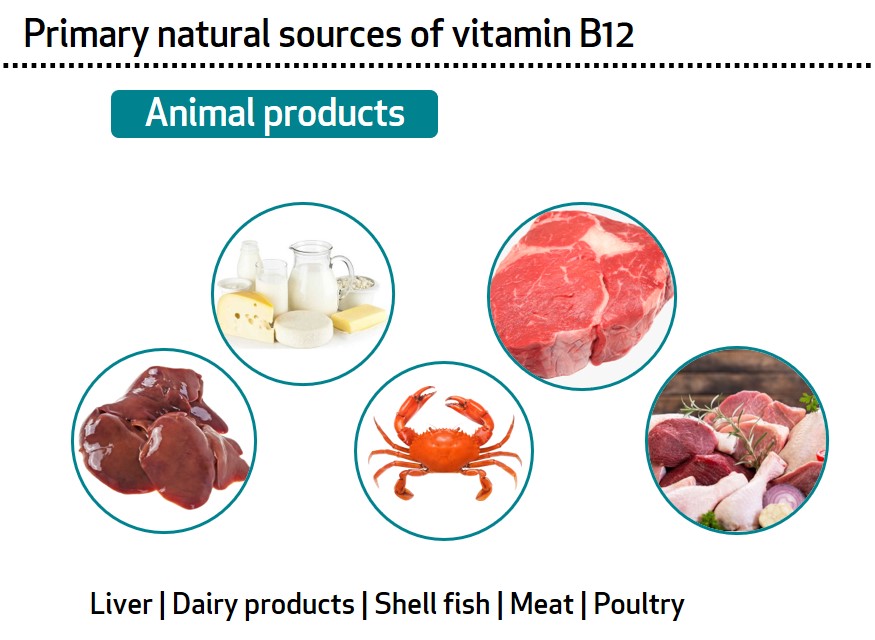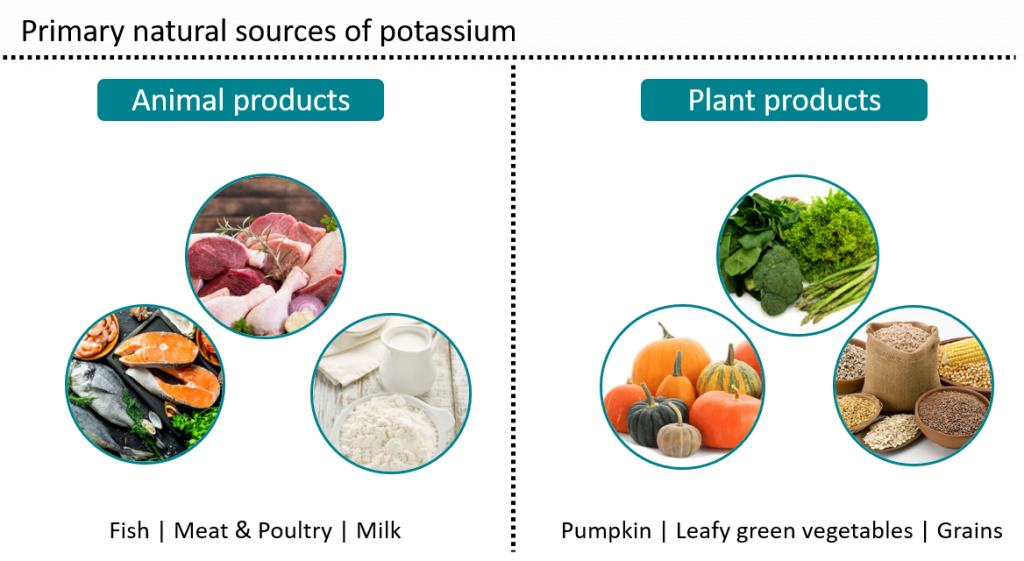
JANUARY 2021
Inspired by the Sight and Life publication “Vitamins and Minerals: A Brief Guide”, we continue with our Learn About Your Vitamins and Minerals series by discussing vitamin B12 and potassium.
Vitamin B12
Vitamin B12, also known as cobalamin, is a water-soluble B vitamin. It exists in several forms and contains the mineral cobalt. That is why vitamin B12 compounds are called cobalamins. Vitamin B12 is vital for proper red blood cell formation, nerve function, and DNA synthesis. Vitamin B9 (folate) and vitamin B12 are closely related. Vitamin B12 plays an important role in converting vitamin B9 to its active form in the body, tetrahydrofolic acid.
Sources of vitamin B12. Vitamin B12 is found naturally only in animal-based food sources. The primary sources include liver, shellfish, some fish (such as herring, sardine, salmon, and trout), meat, poultry, eggs, milk, and other dairy products. Plant-based foods fortified with vitamin B12, such as breakfast cereals and other grain or soy-based products are also good sources.
Vitamin B12 consumed through food sources is bound to protein in the food and released in the stomach by the activity of hydrochloric acid and an enzyme called gastric protease. The free vitamin B12 then combines with a glycoprotein in the stomach called an intrinsic factor and is absorbed in the small intestines. On the other hand, synthetic vitamin B12 added to dietary supplements and fortified foods are already in the free form and are thus able to be directly absorbed in the small intestines. Studies have shown that no matter the form or origin, only about 50% of vitamin B12 that is consumed can be absorbed by adults with a healthy digestive tract. The capacity of the intrinsic factor further limits the amount of vitamin B12 that can be absorbed. Cooking foods at high heat and longer cooking times can result in some losses of vitamin B12.
Vitamin B12 Deficiency and Prevention. Vitamin B12 deficiency develops over several years because the body is able to recycle much of its vitamin B12 by continually reabsorbing it. However, individuals who consume little or no animal products and are not supplementing or consuming vitamin B12-fortified foods are at risk of developing a vitamin B12 deficiency. Some older adults who do not have enough hydrochloric acid in their stomach could also suffer from vitamin B12 deficiency since it is not able to be released into the free form as effectively. It is estimated that up to 15% of the general population has a vitamin B12 deficiency.
Symptoms of vitamin B12 deficiency include anemia, fatigue, loss of appetite, nerve damage with numbness or tingling in the hands and legs, dementia, memory loss, depression, and seizures. Deficiency can be prevented by adequate consumption of foods rich in vitamin B12, consuming foods fortified with vitamin B12, or consuming vitamin B12 supplements.
Vitamin B12 is a water-soluble vitamin, so any excess amount will exit the body through the urine. Thus, no adverse effects have been associated with excessive intakes of vitamin B12.

Potassium
Potassium is an alkali metal that contributes most of the positively charged ions inside human cells. It is sometimes referred to as an electrolyte because of its ability to carry a small electrical charge that activates cells and nerve functions. Potassium helps to maintain the body’s fluid and electrolyte balance and plays a role in enzyme activations, cell integrity, and muscle contraction. Potassium and sodium work together to create electrical signals in the body. This potassium-sodium molecular pump pulls potassium into the cells and pushes sodium out of the cell, thereby creating a chemical battery that drives the transmission of signals along the nerves and helps in the contraction of muscles. Potassium (and sodium) also help the kidneys to function well.
Sources of potassium. Potassium can be found widely in many foods, especially in fruits and vegetables. These include leafy green vegetables, cucumber, squash, pumpkin, zucchini, tomatoes, grains, legumes, bananas, apricots, orange juice, and dried fruits. Animal sources of potassium are meat, chicken, milk, and salmon.
Potassium Deficiency and Prevention. Since potassium is present in so many foods, it is rare for potassium deficiency, known as hypokalemia, to occur solely from low food intake. However, conditions and activities that increase fluid losses beyond normal can cause lead to potassium deficiency. These include vomiting, diarrhea, heavy sweating, and laxative abuse. Certain medications like diuretics may also lead to potassium deficiency. Potassium deficiency is characterized by fatigue, muscle weakness or cramps, constipation, muscle paralysis, and an irregular heart rate. Deficiency can be prevented by adequate consumption of foods rich in potassium. Potassium supplements must be taken only with a doctor’s prescription, as this can cause high blood potassium, which can be dangerous to the body.
In healthy individuals, the kidneys work to maintain normal blood levels of potassium by flushing out excess potassium through urine, sweat, and stool. Potassium toxicity may result from overconsumption of potassium salts or supplements. People with compromised kidneys who eat a high-potassium diet can also suffer from potassium toxicity or hyperkalemia.
Next in this series, we discuss vitamin B6 and fluoride.

